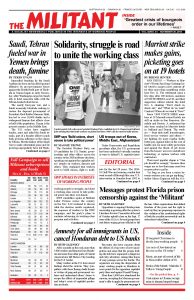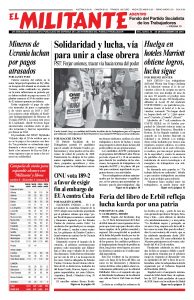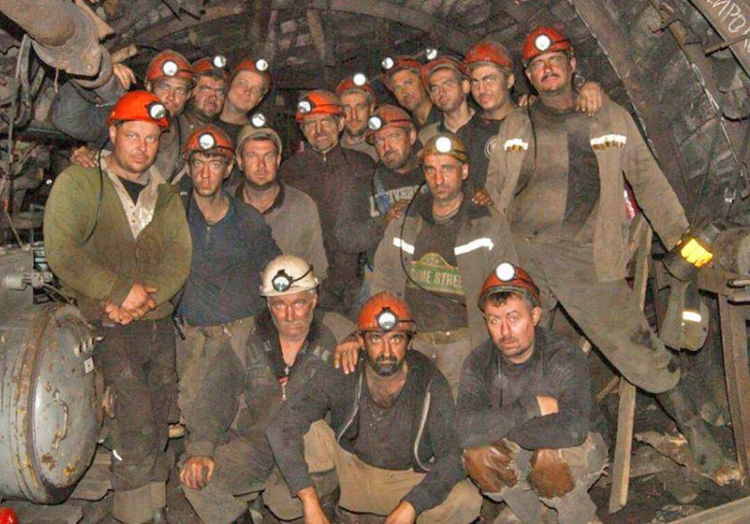Fourteen coal miners at the Grigoriya Kapustina mine in Pryvillia, in the Luhansk region in eastern Ukraine, are sitting in underground, protesting not being paid for months. The action began Oct. 19 when a total of 33 miners stopped work.
They are demanding wages owed from June to September, and for some months in 2015 and 2017. The miners are members of the Independent Trade Union of Miners of Ukraine (NPGU). The mine is near the city of Lisichansk where fierce battles were fought between the Ukrainian army and pro-Russian separatists in 2014.
NPGU chair Mykhailo Volynets said Oct. 29 that if the debt to the miners isn’t paid “protests will rapidly spread to other mines and enterprises.” He encouraged miners from Kryvyi Rih and other regions to join the miners in solidarity.
“Many of the problems in the state-owned mines are caused by the government — by the decisions of the Ministry of Energy and Coal Mining,” Volynets told the Militant in a phone interview Nov. 12. “Money allocated for miners’ wages, safety protections and better equipment is used for other things.” He said the miners are demanding the resignation of the head of the ministry.
“When I visited the mine and went down to talk to the strikers, I didn’t ask them which ones were members of the NPGU and which were not. But some of the miners who were not members asked to join the union,” Volynets said.
The union is providing water, food and medicine, and townspeople are sharing what they have with the miners. Some of the original 33 workers had to leave the underground strike because of health and family issues, Volynets said, but they also rotate in as part of maintaining 14 strikers in the mine. They’re determined to stay.
Miners at state-owned Lvivvuhillia mine in western Ukraine haven’t been paid since August. They rallied and launched a hunger strike at the mine offices Nov. 12, Volynets said.
Protests demanding back wages also took place at the Selydivvuhillia and Myrnohradvuhillia mines in the Donetsk region and Novovolynsk in Volyn.
“These people work in such extremely difficult and dangerous conditions, but their wages aren’t high,” Volynets said in a letter issued publicly by the union. He said that as of Nov. 1 wages owed to miners at state-mining enterprises total 1.2 billion hryvnia ($43 million).
While miners are owed wages in both eastern and western Ukraine, Volynets told the Militant, “the wage debt is higher in the east, which is closer to the military conflict.”
The union announced Nov. 2 that part of 300 million hryvnia the cabinet of ministers had agreed after earlier protests to pay on back wages would be transferred to miners’ accounts. But that does not include pay for other workers, including cleaners and boiler house workers, many of whom are women who get lower wages.
Some of these workers from the Kurakhivska mine technological complex organized a rally that day demanding five months back pay.
“They are having trouble paying for their utilities and electricity, which costs almost as much as in Europe,” said Volynets. “The union has asked the government not to cut off their electricity.”
“We reiterate our full support and solidarity with the miners at the state-owned coal mining enterprises,” Valter Sanches, general secretary of the IndustriALL Global Union, said in an Oct. 30 statement, “and we join you in calling on the Government of Ukraine to pay in full wages in arrears without further delay.”
“The NPGU supports all spontaneous actions by the miners, whether or not the workers are in the union,” said Volynets. “To be a member of an independent trade union takes courage.”
Through strikes and other protests, coal and iron ore miners have forced the government to make some concessions, which has strengthened the union.
The NPGU was forged in 1989-91 in a wave of massive strikes and protests by miners and other workers for higher pay and safer conditions, combined with political demands, including an end to domination by Moscow. These actions helped lead to an independent Ukraine.
Messages of solidarity for the Kapustina miners strike can be sent to the Confederation of Free Trade Unions of Ukraine, St. Velyka Vasylkivska 65, Office 39, Kiev 03150, Ukraine. Email: international-dep@kvpu.org.ua


